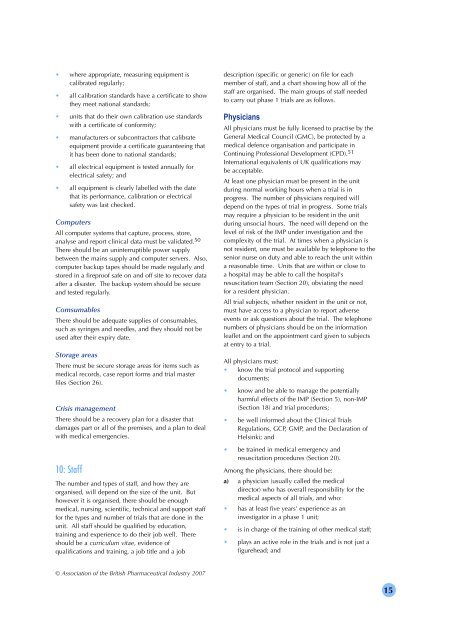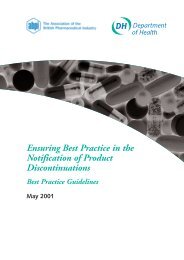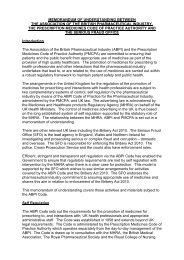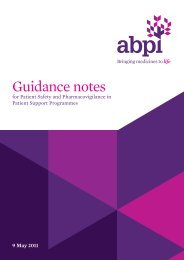ABPI Guidelines for Phase 1 Clinical Trials (PDF
ABPI Guidelines for Phase 1 Clinical Trials (PDF
ABPI Guidelines for Phase 1 Clinical Trials (PDF
You also want an ePaper? Increase the reach of your titles
YUMPU automatically turns print PDFs into web optimized ePapers that Google loves.
• where appropriate, measuring equipment is<br />
calibrated regularly;<br />
• all calibration standards have a certificate to show<br />
they meet national standards;<br />
• units that do their own calibration use standards<br />
with a certificate of con<strong>for</strong>mity;<br />
• manufacturers or subcontractors that calibrate<br />
equipment provide a certificate guaranteeing that<br />
it has been done to national standards;<br />
• all electrical equipment is tested annually <strong>for</strong><br />
electrical safety; and<br />
• all equipment is clearly labelled with the date<br />
that its per<strong>for</strong>mance, calibration or electrical<br />
safety was last checked.<br />
Computers<br />
All computer systems that capture, process, store,<br />
analyse and report clinical data must be validated. 50<br />
There should be an uninterruptible power supply<br />
between the mains supply and computer servers. Also,<br />
computer backup tapes should be made regularly and<br />
stored in a fireproof safe on and off site to recover data<br />
after a disaster. The backup system should be secure<br />
and tested regularly.<br />
Comsumables<br />
There should be adequate supplies of consumables,<br />
such as syringes and needles, and they should not be<br />
used after their expiry date.<br />
Storage areas<br />
There must be secure storage areas <strong>for</strong> items such as<br />
medical records, case report <strong>for</strong>ms and trial master<br />
files (Section 26).<br />
Crisis management<br />
There should be a recovery plan <strong>for</strong> a disaster that<br />
damages part or all of the premises, and a plan to deal<br />
with medical emergencies.<br />
10: Staff<br />
The number and types of staff, and how they are<br />
organised, will depend on the size of the unit. But<br />
however it is organised, there should be enough<br />
medical, nursing, scientific, technical and support staff<br />
<strong>for</strong> the types and number of trials that are done in the<br />
unit. All staff should be qualified by education,<br />
training and experience to do their job well. There<br />
should be a curriculum vitae, evidence of<br />
qualifications and training, a job title and a job<br />
© Association of the British Pharmaceutical Industry 2007<br />
description (specific or generic) on file <strong>for</strong> each<br />
member of staff, and a chart showing how all of the<br />
staff are organised. The main groups of staff needed<br />
to carry out phase 1 trials are as follows.<br />
Physicians<br />
All physicians must be fully licensed to practise by the<br />
General Medical Council (GMC), be protected by a<br />
medical defence organisation and participate in<br />
Continuing Professional Development (CPD). 51<br />
International equivalents of UK qualifications may<br />
be acceptable.<br />
At least one physician must be present in the unit<br />
during normal working hours when a trial is in<br />
progress. The number of physicians required will<br />
depend on the types of trial in progress. Some trials<br />
may require a physician to be resident in the unit<br />
during unsocial hours. The need will depend on the<br />
level of risk of the IMP under investigation and the<br />
complexity of the trial. At times when a physician is<br />
not resident, one must be available by telephone to the<br />
senior nurse on duty and able to reach the unit within<br />
a reasonable time. Units that are within or close to<br />
a hospital may be able to call the hospital's<br />
resuscitation team (Section 20), obviating the need<br />
<strong>for</strong> a resident physician.<br />
All trial subjects, whether resident in the unit or not,<br />
must have access to a physician to report adverse<br />
events or ask questions about the trial. The telephone<br />
numbers of physicians should be on the in<strong>for</strong>mation<br />
leaflet and on the appointment card given to subjects<br />
at entry to a trial.<br />
All physicians must:<br />
• know the trial protocol and supporting<br />
documents;<br />
• know and be able to manage the potentially<br />
harmful effects of the IMP (Section 5), non-IMP<br />
(Section 18) and trial procedures;<br />
• be well in<strong>for</strong>med about the <strong>Clinical</strong> <strong>Trials</strong><br />
Regulations, GCP, GMP, and the Declaration of<br />
Helsinki; and<br />
• be trained in medical emergency and<br />
resuscitation procedures (Section 20).<br />
Among the physicians, there should be:<br />
a) a physician (usually called the medical<br />
director) who has overall responsibility <strong>for</strong> the<br />
medical aspects of all trials, and who:<br />
• has at least five years' experience as an<br />
investigator in a phase 1 unit;<br />
• is in charge of the training of other medical staff;<br />
• plays an active role in the trials and is not just a<br />
figurehead; and<br />
15









